
views
Drawing the Line Between Legal and Illegal Gambling
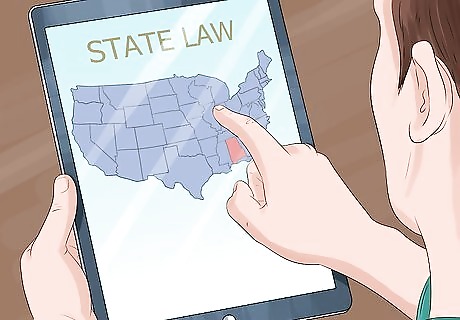
Check the law in your state. Gambling is a heavily regulated and often illegal practice. Various state and federal laws dictate the types of activities that are allowed and disallowed. Every state will vary in their acceptance of gambling practices. If you are trying to identify illegal gambling activities, the first step in the process is reading you state's laws on the subject. In addition to state regulation of gambling, the federal government has also passed laws on the subject. For example, the federal government regulates interstate gambling (e.g., the transportation of lottery tickets between states and online gambling) as well as gambling on Native American territories. In Alabama, for example, most gambling is considered illegal. In addition, you cannot have a gambling device (e.g., slot machines) within the state. However, there are some exceptions. There is one Native American tribe with the ability to operate a casino in the state. Also, some dog racing is legal if the business has permission from the state. In Nevada, for example, most gambling activities are legal so long as you have a permit.
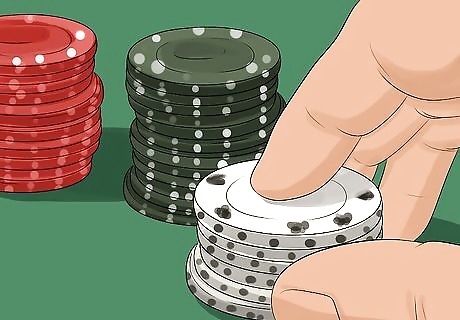
Understand how gambling/gaming is defined. The state law definition of gambling will determine what is and what is not allowed. While each state law definition might differ, gambling is generally defined as the act of betting or wagering something of value on an outcome that is based at least in part on chance with an opportunity to win something. The general definition can be broken down into the following pieces: A bet. A bet, also called consideration, is when something of value is at stake during the game of chance. The consideration can usually be anything and it does not have to be money. The consideration also does not have to have a lot of value. For example, when someone bets on a card game (e.g., poker), they may do so by putting cash or a plastic toy on the line. The cash or plastic toy, in this example, is the consideration. Games of chance. Gambling usually involves some game that is at least partially dependent on chance. If a game or competition is based on skill, it cannot be considered gambling. However, even games that involve skill can be gambling if there is some element of chance. If chance is the biggest factor in the game, it is considered a game of chance and it might be illegal to bet on it. For example, a game solely based on skill would be billiards. A game solely based on chance would be roulette. A game that mixes the two might be fantasy sports. An opportunity to win. You must have a chance to win something of value in order to be gambling. The something of value might be money, property, or even more chances to play.
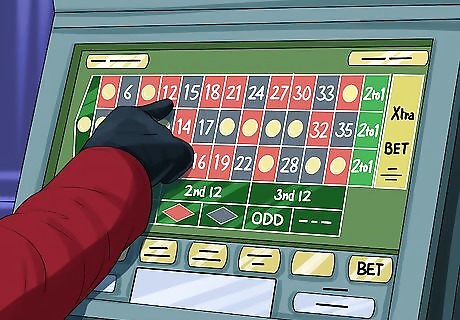
Determine if intent is enough to commit a crime. Some states make it a crime to even intend to gamble. For example, in Kansas, you can be considered to gamble if you enter a gambling place with the intent to gamble, make a bet, enter into a lottery, or play a gambling device. Therefore, in some states, you do not actually have to make a bet to get in trouble. Check your state law and decide if intent is enough to commit a crime.
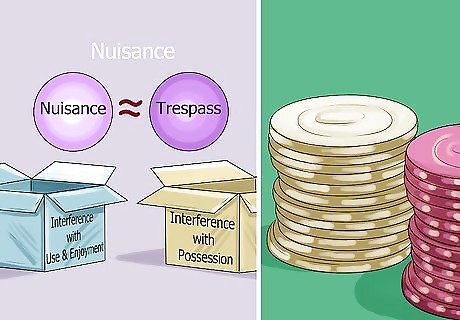
Understand the different types of gambling laws. State laws related to gambling take many forms. States categorize their laws in different ways and not all gambling laws are found in one place. When you are looking at your state's laws to determine what is legal and what isn't make sure you do a complete search to cover all possible laws. For example, in Kansas, gambling laws fall into the following categories: Laws against the public morals. These include laws about gambling, commercial gambling, dealing in gambling devices, possession of gambling devices, installing communication facilities for gamblers, gambling operations. Nuisance laws. These laws prohibit activities, including gambling, on your own property. Lottery laws. These statute make it illegal to do certain things while engaging in legal lottery sales. For example, it is a crime to manipulate lottery machines, wager illegal amounts, disclose confidential information, or play the lottery if you are an employee of the lottery.

Check for commercial gambling prohibitions. Apart from actually gambling yourself, a lot of states also make it illegal to run a business based on gambling. Therefore, in a number of states, including Kansas, you can get in trouble for simply: Operating a place where people gamble Receiving gambling earnings Recording or forwarding bets (e.g., being a bookie) Becoming a custodian of anything of value offered in a bet (e.g., holding on to money that two people are using as consideration in a bet) Setting up a gambling device Allowing the use of a place for gambling activities
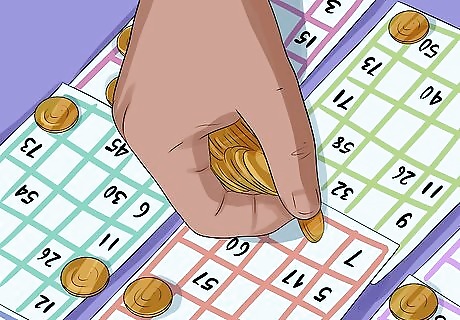
Look for exceptions in the law. Not every form of gambling is illegal carte blanche. Some forms of gambling are legal in one form or another. In these scenarios, drawing the line between illegal gambling and legal gambling can be difficult. However, this is the area where most gambling takes place. If you have trouble determining whether a specific form of gambling is legal or illegal, you should contact your state's gaming commission before taking part in the activity. For example, the following activities can be considered legal or illegal depending on the circumstances: Bingo. In Kansas, for example, bingo is legal if it is conducted by a nonprofit, state licensed bingo parlor. However, bingo is illegal if you manage, operate, or conduct games of bingo outside of the allowed nonprofits. Lotteries. A lottery can be defined as a situation in which a participant pays consideration for a chance to win a prize determined by chance. The most common example of a lottery is a raffle. In a raffle, tickets with numbers on them are sold to individuals. At some point, all of the numbers are put into a container and one of the numbers' is drawn out randomly. Whoever paid for the ticket that corresponds to the winning number gets a prize. This activity can be considered illegal because the purpose of the activity is to make money. However, some institutions, for example some nonprofits and tribal governments, can conduct raffles legally. Also, most state laws differentiate raffles and drawings. Unlike raffles, a drawing is missing the consideration necessary to make it illegal. Social betting. In some states, for example Minnesota, individuals can make social bets legally. Social bets are things like small card games amongst friends, small wagers on sports games amongst friends, and other spur-of-the moment private wagers. However, a social bet can turn into illegal gambling if it occurs on a regular basis, if it occurs at some business establishment, or if it is organized, commercialized, or systematic.

Distinguish between illegal gambling devices and legal amusement devices. In many states, the possession or use of a gambling device is considered illegal. A gambling device is any machine designed to be used in connection with gambling. In Minnesota, for example, a gambling device is gives players an opportunity to win something of value automatically by playing games of chance. Examples of gambling devices include slot machines and video poker machines. In a state like Kansas, poker chips, raffle tickets, and tokens can also be considered gambling devices because they help someone gamble. In states where gambling is illegal, the use or possession of these devices will also usually be illegal. However, not every mechanical device you put money into is a gambling device. Amusement devices, which require you to pay money in order to play a game, are not considered gambling devices. While you pay money to play an amusement device, you are not offered the opportunity to win something of value. Amusement devices can even include machines where you can win small trinkets (e.g., toys or stuffed animals). Examples of amusement devices include pop-a-shot machines, manual claw machines, and most arcade games.
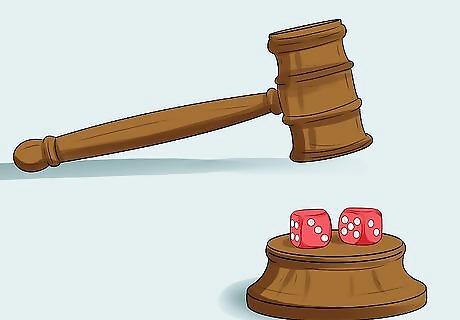
Determine if there is a legal way around the law. Many people get around strict gambling laws by finding places to operate their gambling activities where the law does not apply. While it is possible to circumvent the law legally, it can also be frowned upon. Common examples of legally getting around strict laws include: Locate your activity just outside the jurisdiction that enforces the law. For example, if you live in California where a lot of gambling is illegal, you might cross the border into Nevada to gamble where it is legal. This is why a lot of gambling establishments are located along state borders. Gamble on boats located outside of territorial waters or in international waters. Gambling laws do not reach waterways located outside of certain boundaries established by law. This is why cruise ships can often have casinos and why a lot of dinner cruises and yachts have gambling opportunities. Gamble on Native American territory. The federal government has allowed gambling activities to take place on federally recognized Native American lands. This is the case, in part, because Native American territories are protected by some form of sovereignty. Therefore, most casinos and other gambling establishments located on Native American territories are legal.
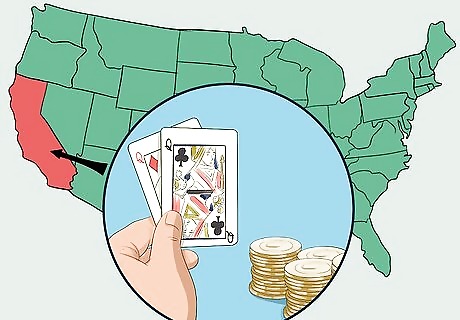
Find established legal gambling opportunities. Most states allow certain types of gambling to take place. Each state will have different laws about what types of gambling is allowed and what is not. Check with your state before taking part in any questionable gambling activity. In Nevada, for example, most types of gambling are legal. In California, for example, card clubs and pari mutual horse wagering is legal. These forms of gambling are considered legal because you are not betting against the business, you are betting against other players. In Alabama, for example, cities with a population of over 300,000 can decide by referendum whether they want to allow horse racing.
Identifying Common Illegal Gambling Schemes
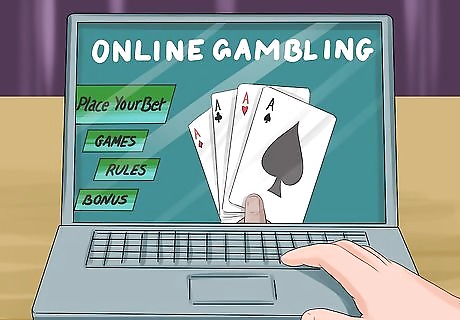
Be aware of online gaming laws. Online gambling has become increasingly popular due to the advent of the internet and the inability to gamble in more conventional ways (e.g., by going to a casino in states where gambling is not allowed). However, placing a bet online in the United States is against the law. Under U.S. law, you are not allowed to place bets on sporting events or virtual card games. You cannot transfer money electronically for bets made in-person and you cannot make wagers with international casinos online if you are located within the U.S.. However, gambling websites are everywhere online because they are hard to shut down, especially if they originate overseas. Just because a gambling website exists doesn't mean it is legal to use. Remember, it is also illegal to transfer money online for illegal bets, or to place your money in an online account for the purpose betting.
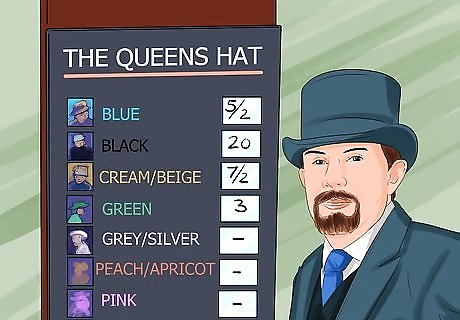
Know about social betting boundaries. A lot of social betting takes place in the United States and a lot of it is perfectly legal. However, because of the strict laws in a number of states, a lot of illegal underground betting also takes place. One of the most common illegal schemes is the use of bookies to make bets. In this scenario, a bookie is someone who facilitates gambling by taking bets, setting odds, accepting money, and paying out winnings. Bookies often make their money by charging transaction fees and by lending gamblers money. Bookies exist to take the place of casinos and sportsbooks where they are illegal. Remember, placing small random bets with friends might be legal. However, when you start to use a bookie on a regular basis and it feels more like a business than a random activity, it might be illegal.

Look out for illegal tournament pools. One of the most common forms of gambling is sports pools. For example, during college basketball March Madness, a lot of offices or groups of friends will charge a fee for you to submit a completed bracket. At the end of the tournament, who ever completed the most accurate bracket wins the money that was charged to enter. While these pools are commonplace, they are usually illegal. In Minnesota, for example, tournament pools are legal so long as there is no entry fee. You are even allowed to offer a prize at the end. However, if an entry fee is charged, it crosses the line and becomes illegal.

Detect underground gambling businesses. Some businesses will try to make money on the side by placing slot machines or video poker machines in their establishments against the law. While these machines may look legitimate, if the establishment does not have a license to operate them, it is illegal. For example, some restaurants will have back rooms where people can play video poker. In addition, some businesses exist solely to conduct illegal gambling activities, These "underground casinos" offer everything a legitimate casino would, except they are not licensed by the state. You will be able to identify an underground casino by the way they conduct their businesses. These establishments will often be invite only, meaning you have to be invited to come and play. In addition, they will often conduct their business in basements or other nondescript locations where they can hide from authorities. Finally, these establishments will often have a high level of security to defend against potential thieves and law enforcement.

Understand fantasy sports concerns. Fantasy sports is a game where you can choose players from a specific sport to be on your team. You create a roster to try and give you the best statistical team possible. Points are awarded based on how well your team does. Nowadays, there are websites that allow you to create fantasy sports teams and bet on the success of your team. While they have been allowed to exist in most states, some states have ruled fantasy sports activities to be illegal gambling. For example, in Illinois, the Attorney General ruled that daily fantasy sports amounted to illegal gambling. The Attorney General decided that the short-term paid contests offered by popular websites should not be allowed in Illinois.



















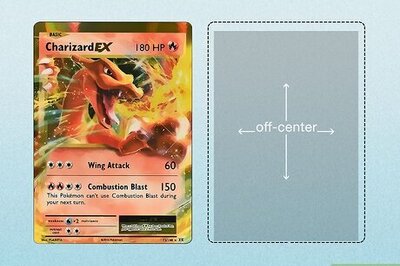
Comments
0 comment